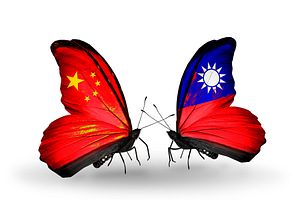Fresh off of a ground-breaking meeting in Singapore between Chinese President Xi Jinping and Taiwan’s President Ma Ying-jeou, the presidential candidate from Ma’s Kuomintang (KMT) party departed on November 9 for a week-long tour of the United States. Eric Chu, the head of the KMT as well as the party’s presidential candidate (at least since they ousted former candidate Hung Hsiu-chu in October), visited Los Angeles, Washington D.C, New York, and San Francisco.
The highlight of his trip was Chu’s time in Washington, where he held meetings with U.S. officials on regional security, economic issues, and cross-strait relations. According to the China Post, Chu met with U.S. Assistant Secretary of State Daniel Russel, National Security Council Asia Director Daniel Kritenbrink, and Deputy Secretary of State Antony Blinken. Neither side was willing to divulge details of the talks, although Chu said, “All that needed to be said was said.”
From Chu’s perspective, the major goal of the trip was to convince U.S. officials that he is best equipped to handle the sensitive issue of cross-strait relations, especially now that the KMT is armed with the historic Ma-Xi meeting as evidence. The opposition Democratic Progressive Party (DPP) candidate, Tsai Ing-wen, has pledged to keep the “status quo” of cross-strait relations intact, but her political opponents accuse her of not having a concrete plan for doing so. They also like to point to the tense state of cross-strait relations under the last DPP president, Chen Shui-bian.
Chu made his message explicit in an op-ed in the Washington Times: “[C]ross-strait peace and stability is now on the line, as Taiwan’s 2016 presidential election once again pits the pro-de jure independence Democratic Progressive Party against the incumbent KMT party.” By arguing that the United States, China, and Taiwan all need a stable cross-strait relationship to secure their national interests – and by claiming a DPP president would undermine that stability – Chu is overtly arguing that Washington should support the KMT.
“My party and my campaign know well that the fundamental interest of the United States is in a stable and peaceful cross-strait relationship,” Chu concluded in his op-ed.
The main sticking point, Chu argued, is that Tsai has not agreed to hold to the “1992 Consensus,” the agreement by both KMT and Chinese Communist Party that there is “one China” (although both sides disagree on what that “China” is). Both Xi and Ma stressed the point that the 1992 Consensus is essential for the cross-strait relationship during their meeting on November 7. Xi was particularly dramatic, warning that without the common political ground of the 1992 Consensus, “the boat of peaceful development will encounter terrifying waves or even capsize.”
From the U.S. perspective, keeping a stable cross-strait relationship is indeed a priority, as Kritenbrink told reporters in a press conference: “For the United States, we have a deep and abiding interest in peace and stability in the Taiwan Strait. That’s where we focus our interest.”
That’s why Tsai has been working to convince analysts and policymakers in Washington that she has no intention of jeopardizing peace in the Taiwan Strait – that was one of the messages she carried during her own visit to the United States in June. Accordingly, the DPP was none too pleased with Chu’s criticisms. In a statement, DPP spokesperson Juan Chao-hsiung expressed the DPP’s “deep regret” that Chu “has reduced diplomacy to a tool for negative campaigning.”
Meanwhile, U.S. officials have been careful not to seem to favor one candidate or the other, as happened in 2011 when anonymous U.S. officials expressed concern over Tsai’s 2012 presidential candidacy to media outlets. Speaking to reporters alongside Kritenbrink, Russel was quick to point out that “contrary to speculation in the Taiwan press, we treat both representatives from the KMT and the DPP with an equal degree of access, with evenhanded treatment. We don’t play favorites.” Kritenbrink added that the United States “will not take sides in the election; the outcome of Taiwan’s election is a matter for the people of Taiwan to decide.”
Despite that, given the importance of the U.S. relationship with Taiwan – particularly on the security realm, but also politically and economically – the domestic Taiwanese audience is fascinated by the question of which candidate Washington “prefers.” Thus it was important for Chu to visit the United States, which he did less than a month after becoming the KMT candidate (former candidate Hung had showed no interest in going to Washington, to the KMT’s dismay).
Visits to the U.S. also serve as a political battleground – not for who will handle Taiwan-U.S. relations better, however, but for who will be the responsible party on cross-strait ties. Both candidates came here with that topic in mind: Tsai to emphasize she will be responsible on cross-strait ties, and Chu to question the DPP track record on the same subject. Ultimately, however, whatever the setting, their main audience remains the Taiwanese public, which will have to make its decision on January 16.

































